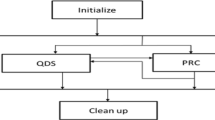Abstract
Binary division operation has immense importance in the field of engineering science. Inherently, division operation is a sequential operation, making it more expensive in terms of computational complexity and latency compared with other mathematical operations like multiplication and addition. This work proposes a novel iterative binary division method with the goal of reducing the delay in its hardware implementation. The hardware circuits are designed using Verilog HDL and verified on Xilinx FPGA. This work also presents a study of area, power and delay of the proposed method for different specifications. At UMC 40 nm technology node, the 32-bit radix-16 fixed-point divider circuit requires 3938 \(\upmu {\text {m}}^2\) area with a dynamic power consumption of 2.82 \(\upmu \)W/MHz. It has a latency of 2–9 clock cycles with a critical path delay of 4.97 ns. This work is further extended to design a single-precision floating-point divider. The divider is implemented with an area of 3353 \(\upmu {\text {m}}^2\), power dissipation of 2.76 \(\upmu \)W/MHz and critical path delay of 4.83 ns.






Similar content being viewed by others
Availability of data and material
This manuscript has no associated data.
References
E. Antelo et al., Digit-recurrence dividers with reduced logical depth. IEEE Trans. Comput. 54(7), 837–851 (2005). https://doi.org/10.1109/TC.2005.115 (ISSN: 2326-3814)
E. Antelo et al., Low latency digit-recurrence reciprocal and square-root reciprocal algorithm and architecture, in 17th IEEE Symposium on Computer Arithmetic (ARITH’05) (2005), pp. 147–154. https://doi.org/10.1109/ARITH.2005.29
J. Ebergen, I. Sutherland, A. Chakraborty, New division algorithms by digit recurrence, in Conference Record of the Thirty-Eighth Asilomar Conference on Signals, Systems and Computers, vol. 2 (2004), pp. 849–1855. https://doi.org/10.1109/ACSSC.2004.1399485
M.D. Ercegovac, J. Muller, Variable radix real and complex digitrecurrence division, in 2005 IEEE International Conference on Application-Specific Systems, Architecture Processors (ASAP’05) (2005), pp. 316-321. https://doi.org/10.1109/ASAP.2005.66
Y. Fu et al., Low latency divider using ensemble of moving average curves, in 2017 18th International Symposium on Quality Electronic Design (ISQED) (2017), pp. 397–402. https://doi.org/10.1109/ISQED.2017.7918348
R. Goldschmidt, Applications of division by convergence. Master’s thesis M.I.T. (1964)
D.L. Harris, S.F. Oberman, M.A. Horowitz, SRT division architectures and implementations, in Proceedings 13th IEEE Sympsoium on Computer Arithmetic (1997), pp. 18–25. https://doi.org/10.1109/ARITH.1997.614875
IEEE Standard for floating-point arithmetic, in IEEE Std 754-2008 (2008), pp. 1–70
M.K. Jaiswal, H.K.H. So, Area-efficient architecture for dual-mode double precision floating point division. IEEE Trans. Circuits Syst. I Regu. Pap. 64(2), 386–398 (2017). https://doi.org/10.1109/TCSI.2016.2607227
K. Jun, E.E. Swartzlander, Improved non-restoring division algorithm with dual path calculation, in 2013 IEEE 56th International Midwest Symposium on Circuits and Systems (MWSCAS) (2013), pp. 1379–1382. https://doi.org/10.1109/MWSCAS.2013.6674913
K. Jun, E.E. Swartzlander, Modified non-restoring division algorithm with improved delay profile and error correction, in 2012 Conference Record of the Forty Sixth Asilomar Conference on Signals, Systems and Computers (2012), pp. 1460–1464. https://doi.org/10.1109/ACSSC.2012.6489269
K. Kataria, S. Patel, Design of high performance digital divider, in 2020 IEEE VLSI Device Circuit and System (VLSI DCS) (2020), pp. 1–6
D.W. Matula, M.T. Panu, J.Y. Zhang, Multiplicative division employing independent factors. IEEE Trans. Comput. 64(7), 2012–2019 (2015). https://doi.org/10.1109/TC.2014.2346206 (ISSN: 2326-3814)
J. Melchert et al., SAADI-EC: a quality-configurable approximate divider for energy efficiency. IEEE Trans. Very Large Scale Integr. VLSI Syst. 27(11), 2680–2692 (2019). https://doi.org/10.1109/TVLSI.2019.2926083
D.M. Muñoz et al., Tradeoff of FPGA design of a floating-point library for arithmetic operators. J. Integr. Circuits Syst. 5(1), 42–52 (2010)
S.F. Obermann, M.J. Flynn, Division algorithms and implementations. IEEE Trans. Comput. 46(8), 833–854 (1997). https://doi.org/10.1109/12.609274
A. Parashar, et al., Fast combinational architecture for a vedic divider, in 2017 14th IEEE India Council International Conference (INDICON) (2017), pp. 1–5. https://doi.org/10.1109/INDICON.2017.8487598
Y. Park, J. Kwon, Y. Lee, Area-efficient and high-speed binary divider architecture for bit-serial interfaces, in 2016 International SoC Design Conference (ISOCC) (2016), pp. 303–304. https://doi.org/10.1109/ISOCC.2016.7799798
U.S. Patankar, A. Koel, Review of basic classes of dividers based on division algorithm. IEEE Access 9, 23035–23069 (2021). https://doi.org/10.1109/ACCESS.2021.3055735
M. Pradhan, R. Panda, High speed multiplier using Nikhilam Sutra algorithm of Vedic mathematics. Int. J. Electron. 101(3), 300–307 (2014). https://doi.org/10.1080/00207217.2013.780298
N. Singh, T.N. Sasamal, Design and synthesis of Goldschmidt algorithm based floating point divider on FPGA, in 2016 International Conference on Communication and Signal Processing (ICCSP) (2016), pp. 1286–1289. https://doi.org/10.1109/ICCSP.2016.7754360
Sorokin and Nikolai, Implementation of high-speed fixed-point dividers on FPGA. J. Comput. Sci. Technol. 6(1), 8–11 (2006)
G. Sutter, J. Deschamps, High speed fixed point dividers for FPGAs, in 2009 International Conference on Field Programmable Logic and Applications (2009), pp. 448–452. https://doi.org/10.1109/FPL.2009.5272492
Z.T. Sworna, M.U. Haque, S. Rahman, An FPGA-based divider circuit using simulated annealing algorithm, in 2018 18th International Symposium on Communications and Information Technologies (ISCIT) (2018), pp. 1–6. https://doi.org/10.1109/ISCIT.2018.8588004
N. Takagi, S. Kadowaki, K. Takagi, A hardware algorithm for integer division. In: 17th IEEE Symposium on Computer Arithmetic (ARITH’05). (2005), pp. 140–146. https://doi.org/10.1109/ARITH.2005.6
J. Verbeke, R. Cools, The Newton–Raphson method. Int. J. Math. Educ. Sci. Technol. 26(2), 177–193 (1995). https://doi.org/10.1080/0020739950260202
Acknowledgements
The authors thank Meity, Govt. of India, for providing software and hardware resources under SMDP-C2SD. We also extend our gratitude to Mr Thockchom Birjit Singha for his help during manuscript preparation.
Funding
Not applicable.
Author information
Authors and Affiliations
Corresponding author
Ethics declarations
Conflict of interest
The authors declare no conflict of interest.
Additional information
Publisher's Note
Springer Nature remains neutral with regard to jurisdictional claims in published maps and institutional affiliations.
Rights and permissions
About this article
Cite this article
Bora, S., Paily, R. Design and Implementation of Adaptive Binary Divider for Fixed-Point and Floating-Point Numbers. Circuits Syst Signal Process 41, 1131–1145 (2022). https://doi.org/10.1007/s00034-021-01832-4
Received:
Revised:
Accepted:
Published:
Issue Date:
DOI: https://doi.org/10.1007/s00034-021-01832-4




